





 Intensive Japanese Course and Bachelor’s Degree
Intensive Japanese Course and Bachelor’s Degree







 Intensive Japanese Course and Bachelor’s Degree
Intensive Japanese Course and Bachelor’s Degree
Hokkaido is the northernmost region of Japan, consisting of one large island and over 500 surrounding islands. Dotting the center of the main island are mountain ranges and impressive volcanoes surrounded by sweeping coastal plains.
The islandsʼ total land mass is 83,000km² which makes up 22% of the total land mass of Japan. Hokkaido is known for its amazing food, natural beauty, world-class skiing resorts and unique history.
Hokkaido University is right in the center of Sapporo, Japanʼs fifth-largest city with a population of 1.95 million.
You will never be short of options when it comes to eating out with friends, taking in Sapporoʼs vibrant cultural scene, or going out for a night on the town. Sapporo has something for everyone.
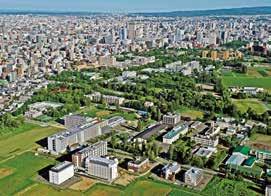

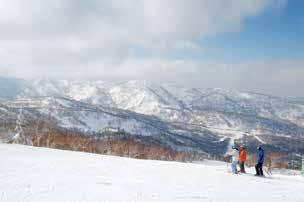




Today, Hokkaido has a population of 5.3 million people, but the region was only fully incorporated into Japan in the mid-nineteenth century. Hokkaido is the home of the indigenous Ainu people. As a place where various cultures meet, Hokkaido is an ideal location to consider issues of cultural diversity and multiculturalism in Japan, Asia and beyond.






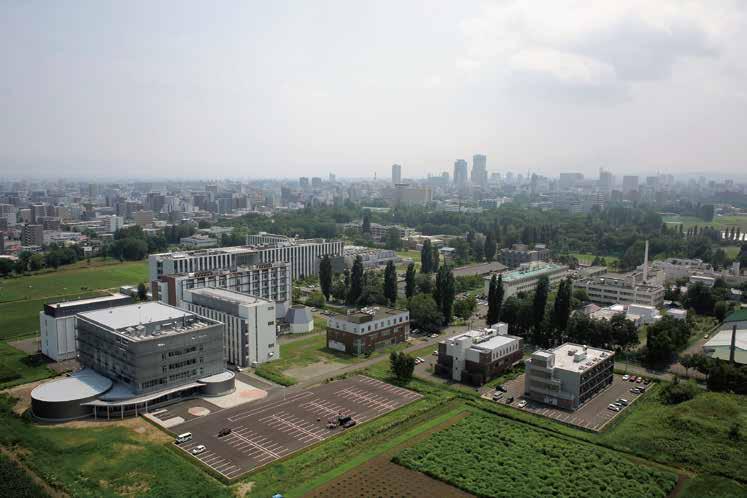
Hokkaido University is one of the oldest, largest, and most prestigious universities in Japan. Boasting the largest number of faculties of Japanʼs national universities, we cover almost all areas of the humanities and social and natural sciences and we are a leader in research activities in Japan and the world.
Hokkaido University alumni include a Nobel laureate, business leaders, research pioneers, artists and writers.
Our graduates benefit from the Universityʼs determination to develop curious minds that are ready to embrace challenges and acquire knowledge, reveal new global perspectives and find solutions which change society for the better.
We offer a broad-based educational experience, world-class research facilities, and all the attractions of living in the cosmopolitan city of Sapporo.
The atmosphere is warm and welcoming, our campuses clean and safe, and we are located in a breathtakingly beautiful setting.
1876 Established 180ha Sapporo Campus Size
Equivalent to over 400 football fields
Total Number of Students Approx. 17,900
11,300 undergraduate and 6,600 postgraduate
Number of International Students Approx. 2,100
From 98 countries and regions
Do you want to study in the most beautiful campus in Japan? In one of the most desirable cities in Japan? And have an amazing international student experience?- Then Hokkaido University is for you.
SPRING Pleasant temperatures with an abundance of colors




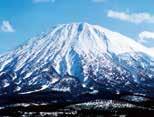

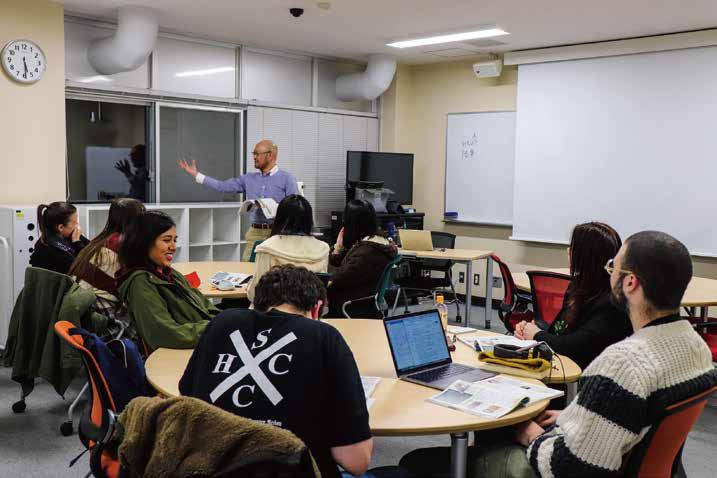
Degree Title: Bachelorʼs Degree (in the field of Japanese Studies)
Program Length: 4 years (4.5 years including the Intensive Japanese Course)
Starting Date: October (Intensive Japanese Course + Bachelorʼs Degree) or April (Bachelorʼs Degree only)
Characteristics:
1) Intensive study of the Japanese language ‒ you should be completely fluent on graduation;
2) The study of Japan in four main academic disciplines ‒ history, cultural studies, sociology and political economy;
3) Co-learning with Japanese students ‒ you will take many classes with your Japanese peers;
4) A flexible curriculum that allows you to discover your Japan from the unique and multicultural vantage point of Japanʼs northernmost island.
The Modern Japanese Studies Program offers one of the most rigorous Japanese language training programs of any four-year Bachelorʼs Degree. You do not need to have any prior experience of studying the Japanese language to apply for MJSP, but mastering the language sufficiently to study history, culture, society and political economy in Japanese is a requirement to graduate from MJSP.
The Intensive Japanese Course ensures students have enough Japanese language ability on entry to the Bachelorʼs Degree.
People who already have intermediate level Japanese may apply for exemption from the Intensive Japanese Course. Their Japanese language ability will be assessed in a Japanese interview taken as part of the entrance exams.
There are two modules to choose from: History/Culture and Society/Political Economy. One module becomes your major; the other is your minor. You start by taking Japanese language courses alongside humanities and social sciences courses in English.
Once you have sufficient Japanese, you may take courses in Japanese in the faculties of Law, Humanities and Human Sciences, Education, and Economics & Business. This truly bilingual degree program is the ultimate preparation for an international career related to Japan.

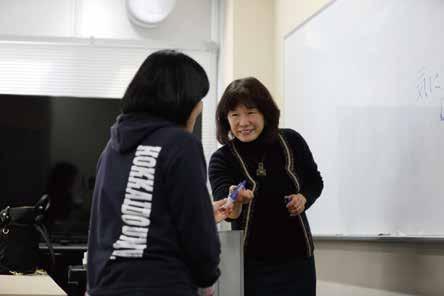


People from all around the world come to study on MJSP. The international atmosphere is a fascinating learning experience in itself. We are all joined, however, by our common, deep interest in Japan. There is no better place to learn about Japan than actually in Japan.
Our ambitious and defining educational aim is for all MJSP students to be able to take regular university classes in the Japanese language alongside their Japanese peers. We share our curriculum in English with Nitobe College, an international education program for students in other faculties. Extensive educational integration with the Japanese student population from the first year of the degree program is another key philosophy of MJSP.
INTENSIVE
Beginner's Japanese
Japanese language (beginners to intermediate)
In English
An introduction to study skills and modern Japan
Japanese language (intermediate to advanced)
Japanese Language
Applied Japanese (content-based courses using intermediate level Japanese)
Applied Japanese (Academic Japanese)
Japanese Studies (History, Culture, Society, Political Economy)
Introduction to Japanese Studies I: History
Introduction to Japanese Studies II: Culture
Introduction to Japanese Studies III: Society
Introduction to Japanese Studies IV: Political Economy
Multiculturality in Hokkaido and Japan
Aspects of Japan:
Courses provided by MJSP and other faculties in English
In English
Major/Minor Module Subjects
Japanese History I-III
Japanese Culture I-III
Japanese Society I-III
Japanese Political Economy I-III
*I – Japan and the World
*II – Advanced Readings
*III – Japanese(History, Culture, Society, Political Economy) in Japanese
Applied Japanese
Applied Japanese (Business Japanese)
In Japanese
You will choose your major from History/Culture Module or Society/Political Economy Module. The other one becomes your minor.
The subjects will be taught in Japanese in faculties of Law, Humanities and Human Sciences, Education, and Economics & Business.
General education seminars: Courses in English based on the research of English-speaking faculty
Intercultural exchange seminars: Group-based learning with Japanese students in Japanese
In Japanese
Internship at a company (Optional)
Study abroad at one of Hokkaido University’s partner universities (Optional)
Liberal Arts Courses/Foundation Courses Modern Japanese Studies Workshop, etc. Optional courses taught in Japanese in other faculties (for example, in the sciences)
Individual Research
English and/or Japanese
Writing
Project Study I
This is for students enrolled in 2024. Subject to change. For the most up-to-date information on the curriculum, visit the MJSP website.
About one sixth of the total credits required to complete MJSP are categorized as Project Study. Each year you can design your own research project suitable for your interests and career aims.
・In Year 1 (Academic Writing) learn how to structure and reference academic essays.
・In Year 2 (Project Study I) make an oral presentation about your research in Japanese for the first time.
・In Year 3 (Project Study II) be creative and showcase your growing expertise in Japan through a longer piece of research.
・In Year 4 (Project Study III [Graduation Thesis]) undertake an extended piece of academic research.
Receive one-on-one or small group supervision from a professor assigned to you as your supervisor based on your interests.
■History/Culture Module
・Repatriatesʼ literature in post-war Japan: standardisation of narratives and integration through consensus and forgetting
・Yuu wa nanishi ni Lonely he? An analysis of the nature of loneliness in contemporary Japan
・Film-induced tourism- A case study of“Nham mat thay mua he”(2018) and tourism planning in Higashikawa, Japan
・To what extent dose a shared native language other then English affect the frequency of miscommunication between Pilots and Japanese Air Traffic Controllers at Japanese airports?
・Japanese Shodo One of Japanʼs first “Registered Intangible Cultural Properties;” Moving towards UNESCO nomination and its future direction
■Society/Political Economy Module
・A Study On Japanʼs Foreign Labor Shortage post-COVID-19 Pandemic in the Hospitality Industry
・Sustainable development in Japan
・“I Wish I Could Throw It Away” Complex Feelings about Unwanted Gifts
・Discussions on the Future of Japanʼs Arctic Region Relation: The Effects of Russia-Japan Relations
・The study of credit cards and the resulting impacts on consumer spending in Japan
・The Definition, Meaning, and Image of ʻOtakuʼ in Different Time: Observing the Differentiations in Linguistic, Cultural, and Social Aspects in Japan and Thailand
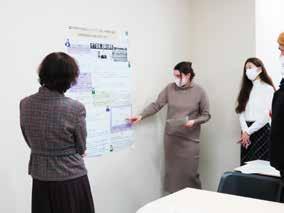
I research the political economy of Japan and East Asia, particularly the Japanese economy from the Meiji period to after WWII. I am currently researching trade policies and government protection of the agricultural sector.
I lived in the United States for 15 years and have taught at the University of Washington. I encourage students to get actively involved in class discussion.

My research focuses on the history and development of the Japanese language, for example, through analysis of debates in the Imperial Diet and prewar Japanese language textbooks.
I am from Sendai. I speak using the Sendai dialect that I learned from my grandmother.
I have worked as a Japanese teacher in Bangkok, Taipei and Okinawa.
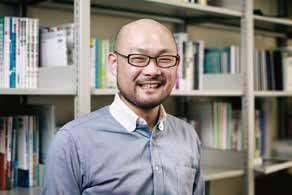
I am a historian specializing in modern Japanese finance. I have published about the origins of the Bank of Japan, gold standard adoption, and the nature of Japanese financial imperialism in the colonies, spheres of influence and occupied territories before and during WWII. My latest project sheds light on the workings of exchange banks in Asia after 1873. From now on, I also plan to write about the treatment of financial matters in the press, mostly political cartoons published in satirical journals.
Takayuki
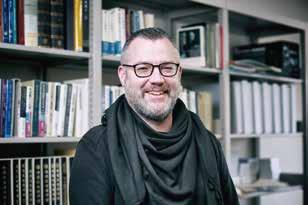
As a linguistic anthropologist and cultural semiotician, I am broadly interested in the meaning of communication and sociality: how ideas and assumptions about language, media, interaction, voice, and so forth, shape everyday habits, institutional practices, and political processes. I have written on themes such as anonymity, solitude, characterization, voice acting, affect, and popular history.
NOZAWA Shunsuke I teach classes on diverse topics, ranging from popular culture to politics of language, from anthropology of Japan to academic writing and methods. My classes are mostly discussion-based, and I am looking forward to working with students to create meaningful learning experience together.
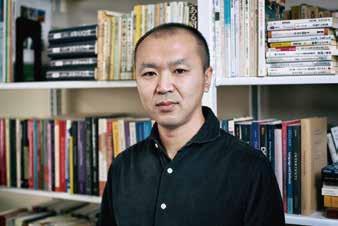
My research currently focuses on food, health and illness in Japan. I have a range of interests including gender, intimacy, employment, risk, emotion, and well-being which inform my classes.
In class I encourage active discussion and student involvement based on lecture content, assigned readings and multi-media.

Political Economy
My research focus is on rural Japan. My research interests include the practice and transmission of traditions in contemporary Japan, regional revitalization and demographic decline and alternative lifestyles in rural areas. Recently, I have also conducted ethnographic research into hip hop practitioners in Hokkaido. Furthermore, I have started a research project on transnational mobility of Japanese contemporary artists in Europe. Susanne
I believe that learning should not be confined to the classroom. I encourage students to explore their environment to reflect on issues we discuss in class.
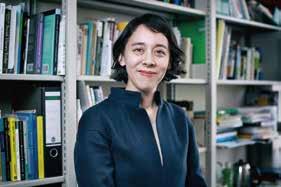
My research is about the movement of settler colonists following the collapse of the Japanese empire. In my class we look at how former settler colonists made the transition from empire to nation-state and the ways this influenced Japanese society after 1945. I also like to use a comparative approach by thinking about forced and coerced migration in Northeast Asia in a global context. As a teacher I encourage active learning through class discussion, group work and independent study. I look forward to meeting you!
History/Culture Module
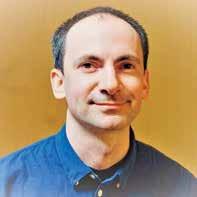
My research focuses on the theories of International Relations and Security Studies in the Indo-Pacific region. I am currently conducting research on the strategic relationship between Japan and New Zealand.
In my class, I encourage students to participate actively in class discussions based on lecture materials. My role in class is to facilitate student-centred learning by providing an open learning environment.
History/Culture Module
Jonathan BULL
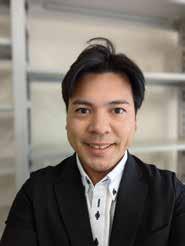
Society/ Political Economy Module
The Modern Japanese Studies Program Lecture Series is a series of guest lectures given by researchers from outside the university, or other people whose professional experience is relevant to Japanese Studies.
The lectures aim to broaden studentsʼ interests in the many aspects of Japanese Studies. There are also MJSP Workshops, in which the guest lecturers lead seminars or local field trips.
Roland Kelts delivers a guest lecture titled "Anime, Manga, Sushi & Cosplay: how Japan Enchants the West" as part of the MJSP lecture series.
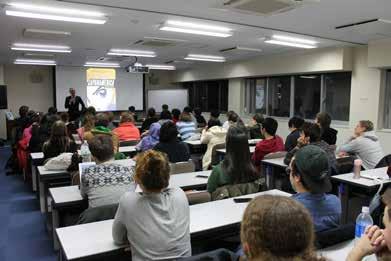
Applicants We Are Seeking
Application Qualifications and Requirements
Refer to the latest Application Guidelines on the “How to Apply” page in the MJSP website.
https://www.oia.hokudai.ac.jp/mjsp/

Application Schedule

Online Registration
Deadline for Arrival of Recommendation Letter (by post)
Online Interview
Notification of Successful Applicants
Enrollment in Intensive Japanese Course
Enrollment in Modern Japanese Studies Program (Bachelor’s Degree)
Fees and Scholarships
Online Registration
Deadline for Arrival of Recommendation Letter (by post)
Online Interview
Notification of Successful Applicants
Enrollment in Intensive Japanese Course
Enrollment in Modern Japanese Studies Program (Bachelor’s Degree)
Tuition fees for Intensive Japanese Course is ¥181,200 (6 months) and for Bachelorʼs degree program is ¥535,800 a year. However, we provide considerable financial support to offset the cost of your education (See the table below). Students who have not received fee waivers during the second to fourth years may apply for the universityʼs tuition fee exemption program (25%, 50%, or 100%). *Correct as of January 2024
Intensive Japanese Course
1st Year
2nd-4th Year
We are planning to waive the enrollment fee for the Intensive Japanese Course.
*The course tuition fee is ¥181,200.
We are planning to waive the entire enrollment and tuition fees in the Modern Japanese Studies Program.
In the second year and thereafter, 100% or 50% of the tuition fees will be waived for selected students based on academic performance.
* Waivers will not be available to all students.

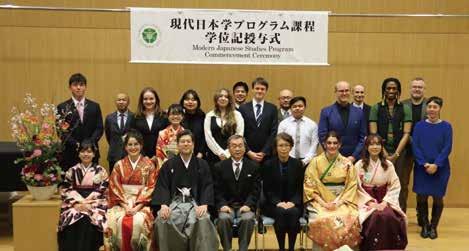
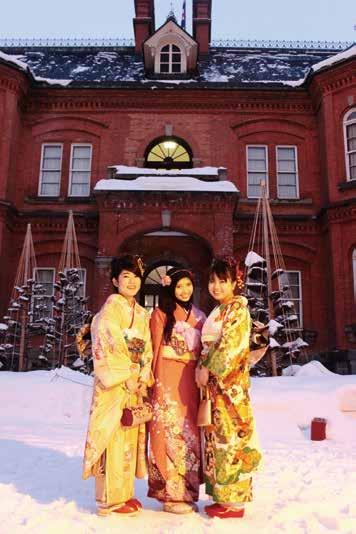
With over 250 university clubs and societies to join, there will be something to suit everyoneʼs interest. Join one of the teams that dances in the Yosakoi Soran Festival, play in the university orchestra, go skiing in Niseko or learn a Japanese martial art.
You will find that joining a club is a fascinating insight into Japanese life and culture, as well as a great place to make Japanese friends.
ngs may not always go smoothly, but the International Student lways there to help you.
ac.jp/en/
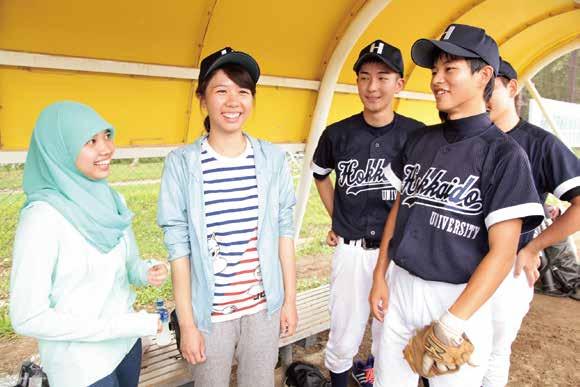
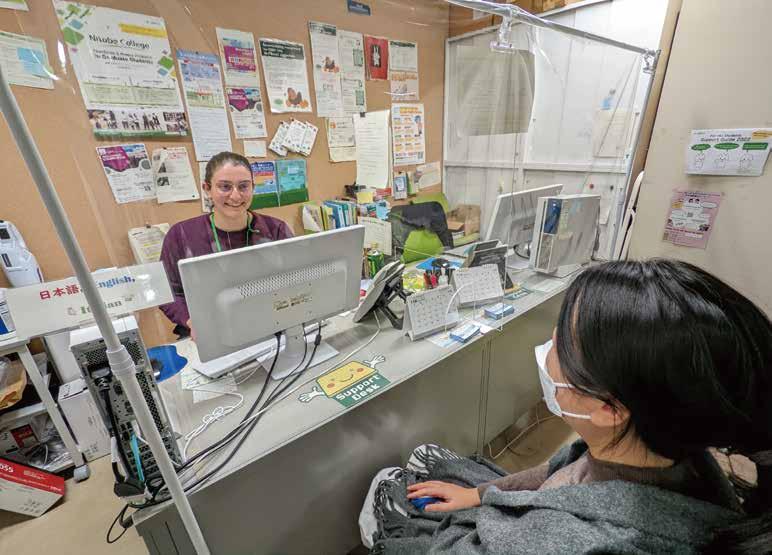

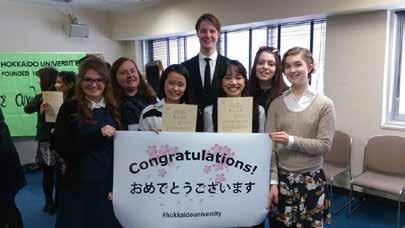


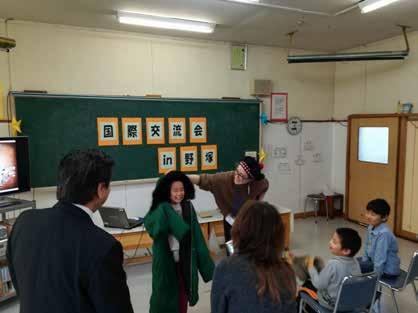
Sapporo has an excellent standard of living at reasonable prices compared to other large cities in Japan. Your budget will depend on your lifestyle, but the table below gives a basic guide of your expected living costs while on MJSP.
Housing
Food Misc
¥35,000~45,000 / month
¥10,000~15,000 / month
¥20,000~35,000 / month
¥15,000~20,000 / month
¥420,000~540,000
¥120,000~180,000
¥240,000~420,000
¥180,000~240,000
Budget for at least ¥40,000 per month, including bills. It may be more than this depending on your lifestyle.
Covers textbooks, photocopying, study trips and other education-related expenses.
This figure may change significantly according to personal lifestyle choices.
Mobile phone, club activities and other optional expenditure.
MJSP students generally spend their first semester in Japan living in student dormitories. The approximate rent is ¥25,000 ¥30,000 per month (not including electricity, heating and water bills). Thereafter, students will find their own accommodation in Sapporo. Monthly rents are about ¥30,000~¥40,000 per month (although this may vary according to size and location).
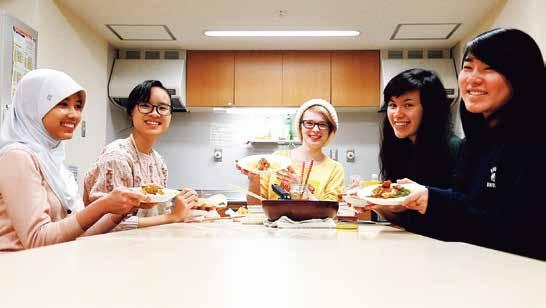


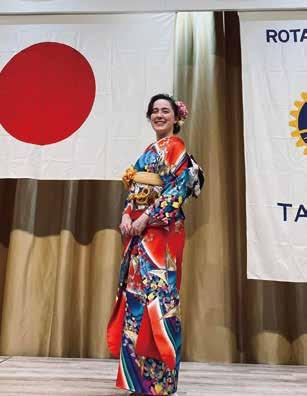
My time in MJSP and Japan has been rich in opportunities for cultural exchange and personal growth. Along the way, I have joined a Buddhist temple, engaged in cultural exchange programs in public schools across Hokkaido, gardened with the Universityʼs agriculture club, learned traditional fan dancing from a local elder, been hired as an extra for a Japanese yogurt commercial and again for a Netflix TV series shoot, milked cows on a dairy farm in Urahoro, have become an experienced Japanese cook, and earned my Japanese driverʼs license in Japanese.
Through MJSPʼs Project Studies (research papers) and Japanese classes, I have gained confidence in my Japanese language ability (much to my surprise) as well as the initiative to think outside the box and pave my own path. Most importantly, through MJSP Iʼve developed a strong network of friends from around the world whom I cherish and depend on. While these last few years have been difficult for many including myself, the amazing students and professors I have had the honor of meeting through the program have been an endless source of motivation, inspiration and strength.

To me MJSP has been one of the greatest challenges, one of thos that pushes you to strive higher and higher. I had already lived in Japan before, but these four years have been full of self-growth and some of the most eye opening of my life. MJSP isnʼt an end: it is a stepping stone and it does require for you to sculpt it into what you expect of it, and for you to be proactive about making the most out of every opportunity. But it is also okay for you to stumble: I have written about a different topic for each of my ʻproject studyʼ courses and have done a lot of soul searching. Which led me towards editing. I could never be grateful enough for everything this program has given me, and Iʼm sure thereʼll be enough space for you to find yourself as well if you chose to join MJSP!

life. MJSP staff members were always sweet and helpful and our professors always went the extra step by offering council and pushing us academically. Through my research, Iʼve met a number of people and friends from different backgrounds which helped by allowing me to view life from different perspectives and boosting my networking skills. Although this journey was challenging sometimes, in many ways it prepared me for my career in Japan. After completing MJSP the opportunities available are abundant and diverse so even if you get a little disoriented along the way. There are a number of profitable paths to choose from.
Sofiane KOHENIn the twenty-first century, Asia will increasingly take center stage in global affairs. Japan is the worldʼs number three economy and is a regional leader in business, technology and innovation. Your bilingual and multicultural education on MJSP provides the skills for various career paths.



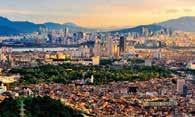
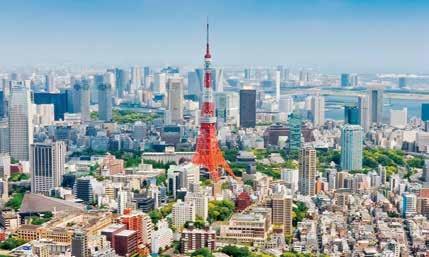

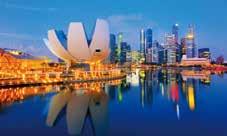
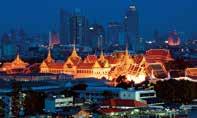

“Be Ambitious” is the motto of Hokkaido University. These are the words of Dr William Clark, the first vice-president of Sapporo Agricultural College.
As a Hokkaido University graduate you will join the tens of thousands of other alumni who have turned an education at the university into a successful career. We will do what we can to help you on your way toward realizing your ambitions.
【Place of Employment】
・AlphaSights ・Asahi Diamond Industrial Co., Ltd. ・ASUKA Tax Accountant Corporation
・Amazon Japan LLC ・CRYPTON FUTURE MEDIA,INC ・Duck Creek Technologies
・FAST RETAILING CO., LTD. ・Fossil Vietnam ・Fujitaka Corporation
・Hokkaido Television Broadcasting Co., Ltd ・IBM Japan ・KEP EAST, Inc. ・Lift Inc.
・Mitsui O.S.K. Lines ・NC Network Co., Ltd. ・NIKKEN TOTAL SOURCING, Inc.
・North Pacific Bank, Ltd. ・PTS Consulting Japan KK ・PwC Japan LLC ・Randstad K.K.
・Real Made Corporation ・SCS-Invictus Holdings Pte. Ltd. (Singapore)
・TAIYO KOKORO Kindergarten ・TOYOTA TSUSHO CORPORATION ・Wolt Co., Ltd. ・Zenken
【Graduate School】
・Eötvös Loránd University ・Free University of Berlin Global MA Program
・University of Hawaii, Manoa
・School of Business Administration Hitotsubashi (MBA)
・Hitotsubashi University Graduate School for Language and Society
・Hokkaido University Accounting School
・Hokkaido University Graduate School of Humanities and Human Sciences
・Hokkaido University Public Policy School
・University of Ottawa Department of History (Masterʼs Degree) ・San Jose State University
・Sophia University Graduate School of Global Studies
・Masterʼs Program of Education at University of Tsukuba ・University of Turku
Research/ Education
Business
Journalism/ Tourism
Translation/ Interpreting
Discover Your Own Path
Pursue postgraduate studies and a research career relating to Japan, or become a teacher in Japan or your home country.
Work for a Japanese company that actively recruits Japan-literate international staff, or an international company with operations in Japan.
People around the world want and need to know what is happening in Japan and Asia. You will be ideally qualified to show them.
Bilingualism opens up many opportunities, from subtitling films to simultaneous interpretation at conferences.
With the insights and inspiration gained from your years in Japan, put into action your own vision for really making a difference.
(Class of 2019-2022)Institute for the Advancement of Higher Education
Hokkaido University
Kita 17, Nishi 8, Kita-ku, Sapporo, 060-0817
Modern Japanese Studies Program Office
+81-(0)11-706-8048・8049
mjsp@oia.hokudai.ac.jp
Admission Center (for Admission Inquiry)
+81-(0)11-706-8045
adm-mjsp@academic.hokudai.ac.jp
Hokkaido University's Modern Japanese Studies Program
mjsp.hokkaido
@MJSP_Hokkaido www.youtube.com/HokkaidoUniv

https://www.oia.hokudai.ac.jp/mjsp/
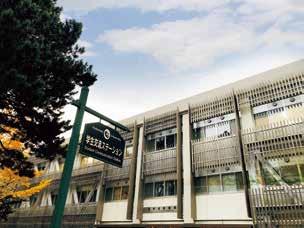 Design: Kurando IKEDA http://ikedakurando.com/ All rights reserved: Hokkaido University’s Modern Japanese Studies Program Updated in March, 2024
Design: Kurando IKEDA http://ikedakurando.com/ All rights reserved: Hokkaido University’s Modern Japanese Studies Program Updated in March, 2024